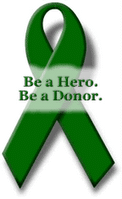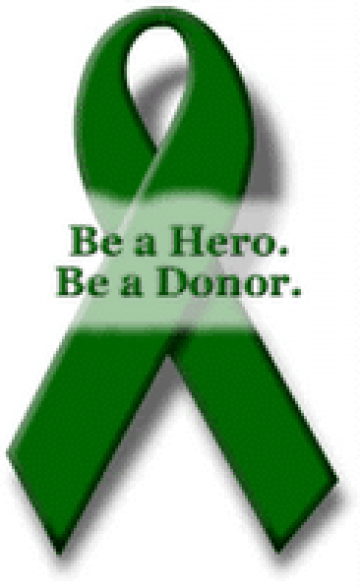
I’m going to borrow a bit from Dora today. She wrote in a comment on her last post:
Incidentally, I have heard second-hand stories about latter-day saints being reluctant to donate organs. Something about not being able to be resurrected if your body parts are not located in one place when it’s time to be ressurected. That line of thinking sounds totally bizarre to me. Has anyone else run across this?”
I think this is crazy talk–to think that there is LDS doctrine that discourages Saints from donating organs because of the resurrection. Maybe I am just prejudiced because I am an amputee so my leg is already ‘missing’ and I’ve always imagined it would be with me in the hereafter no matter where its various molecules have ended up in the meantime.
What about you, have you ever heard this folk doctrine discouraging organ donations? Are you a donor yourself? Why or why not?






19 Responses
I think this is connected to the idea of avoiding cremation when possible, written about in the Ensign here (scroll down a bit). The pertinent points are:
The body was God’s creation and, according to Christians, it would rise with the spirit in the resurrection. Thus, to cremate it would be an act of disrespect before God. … We reaffirm the perspective that the body is good and, as a creation of God, is to be respected. … Generally, Latter-day Saints in the Western world have felt that nothing should be done which is destructive to the body.
I don’t think it is *much* of a stretch to feel that organ donation is ‘destructive to the body.’ Especially if you have a mental image of organ donation as the sort of deal where the body is stripped of anything useful and left empty shell. That said, organ donation is probably something most saints should reconsider. I don’t think it’s that different than donating, say, a kidney, something most LDS people would probably be willing to do if asked.
starfoxy,
I’m surprised to learn that the church frowns on cremation.
Many aspects of the American mortuary process (check out Jessica Mitford’s The American Way of Death A) might be considered more disrespectful to the body than cremation or organ donation. I’m planning on donating my organs and being cremated. It just seems like the responsible thing to do.
I know an LDS woman who donated a kidney to a co-worker, so not all of us believe that donation is a problem. I do think it’s related to the cremation taboo. I was told that I shouldn’t pierce my ears, back when I was in middle school, because the holes would rise with me in the resurrection. My opinion was that I’d probably still want pierced ears even in the resurrection.
Lee, the taboo against cremation is pretty strong. I’ve told my family that I want to be cremated, but I doubt they really think I’m serious. A non-LDS man in our little Utah town was cremated a couple of years ago, and his relatives, knowing what a big deal it was, actually warned people ahead of the funeral so they wouldn’t be shocked when they showed up and found that Walt was just in an urn.
I remember hearing some sentiments along those lines against organ donation among Church members back when I was a kid (early 1970s). Not from Church leaders, though, and I don’t recall anything since.
The Ensign published something directly on point in 1988:
The Church has taken no official position on organ transplants. It seems obvious, however, that organ transplantation does not affect one’s resurrection, since the organ would soon have returned to the basic elements of the earth following death anyway. Whatever happens to an organ following death, we are promised that “every limb and joint shall be restored to its body, yea, even a hair of the head shall not be lost.” (Alma 40:23.)
See http://tinyurl.com/u8r2d
Organ donation was for some time officially “discouraged” in the General Handbook of Instructions. It would be interesting to know if/when this paragraph got deleted from the handbook. Cremation was likewise discouraged, except in countries where it was required by law. AGain don’t know if/when that changed in the handbook.
In support of Starfoxy and Paula’s comments: In the U.S., the bias against cremation is rooted deeply in Judeo-Christian culture. Biblically and historically, burning was perceived as pagan, associated with the execution of heretics and witches, and used to desecrate the bodies of the worst criminals. The bad feelings towards organ donation may be connected to a sense of desecration of the body, and the resurrection rationale may just be a way of justifying the aversion.
Attitudes towards cremation and organ donation vary greatly by culture, however. In Japan, cremation is the proper way to honor a body after death, but the Japanese have one of the worst rates of organ donation in the developed world.
It seems to me that Latter-day Saints should be among those with the highest rates for organ donation, believing as we do in power of the Atonement to turn bad things into good. I can think of few better ways to be a direct participant in that process! How could God’s power to resurrect possibly be limited by whether specific organs are decomposing with the rest of the body or living on in the body of someone else?! My desire to donate my organs is noted on my driver’s license, and after I explained my thoughts on organ donation to my just-turned-16-year-old daughter, she also registered as an organ donor.
BTW My sister and brother-in-law recently chose to have their baby son cremated following his death from SIDS so that they can take “him” with them through the rest of their lives. I didn’t hear of any reluctance – certainly no points of controversy – on the part of their bishop or ward members to support that decision.
I don’t know about any doctine, but I’m still a relative newbie, and bow to the wisdom and experience of those wiser than me on this one.
That said, I am a donor. Never crossed my mind not to be- and also would donate a kidney or something else while living without a second thought. I don’t want to be a cadaver at a hospital for students to learn on, but when I go, if there are organs that will save another persons life, have at them. It seems crazy to think the Lord cares about the details of our parts…
I’m with Jana, whatever was once, will be restored. (my wonder is what that will mean to all the crazy plastic surgeries!)
So on a practical level – how does one go about becoming a donor? Where do I sign up?
Frankly, I think it is totally ridiculous to bury the dead as we do (in the preesent US culture). So much time and money spent on making the deceased look pretty. So much land used for burial grounds. So much money going to mortuaries. When everyone ends up looking pretty much the same after a decade or so.
I think cremation is smart. I still remember visiting my mother’s family’s mausoleum out in the Japanese countryside. Generations of family remains in orderly little boxes inside a large stone building, and I think it had a statue or something on top.
I’m a donor. I carry the pink card in my wallet, with the little sticker on my driver’s license (Caroline, check with the DMV). Depending on how and when I die, I would be an organ donor, or donate my body to science if it was needed. Even fledgling doctors need someone to practice on.
I’m a whole body donor, as well. If we want good doctors, we have to give them good instruction, and dissecting cadavers is fascinating and very helpful to them. I have no sentiment about this particular collection of molecules I carry around. Because I eat meat now, I took a lot of these molecules from the bodies of other beings, anyway. And whatever material goes to make up my body at any given time is changing out constantly throughout my life. There may not be any molecules still here from when I was a baby, for instance.
It’s also true at the lowest level that particles don’t even have identity, physics tells us. Because of the way quantum mechanical probability density functions work, when you have, say, two electrons at one place and time, then you detect them again later, there is no saying “This is electron A (from before) and this one is B.” Instead, there’s only a certain probability that this one is A. It might be B with this other probability. And you aren’t talking about incomplete knowledge, either, but about identity. Which one it is (A or B) is indeterminate in actuality. In fact, it’s even possible that the universe is made up of only a single particle weaving its way back and forth in time.
So, at the deepest level of physics that we understand, the concept of “these molecules” doesn’t really have any meaning. Your body is a pattern only. It’s a recipe. It’s not a particular thing. God has the recipe, so I’m not worried about him losing it. =)
I’ve always signed up as a donor when I got my driver’s license — in Alaska, Utah and California. So Caroline check with the DMV.
I’ve always thought it would be a pretty sorry kind of god to believe in if i didn’t even think He could make me a new cornea or kidney.
In my chaplaincy files somewhere, I have a quote from a prophet (Hinckley, I think) saying that organ donation was a good and noble thing to do. I’ll try to find it in the next couple days.
I became a huge advocate of organ donation after working at a hospital and watching 1) people die because they were too low on the transplant list, and 2) canidates who died without their organs being harvested because their family members wouldn’t allow it.
The DMV is a good place to start, but ultimately, (at least in Massachusetts) your next of kin gets to decide whether or not your organs are donated. So, it’s crucial to make sure that your spouse or other close family member knows what your wishes are and will carry them out. It was hard to see a driver’s license for organ donation and then have a family refuse to donate.
I will most likely need a kidney transplant in the near feature. I can’t imagine that there is a policy somewhere in the church that would condemn me to kidney failure and premature death because somebody shouldn’t be parted from an organ in this life. It seems silly and inhumane.
I’ve also never really understood the stance against cremation, just because certainly there must be plenty of people who die in explosions and fires (or who were burned at the stake!) who will still be resurrected. It seems crazy to imagine that the method of death and burial changes what happens in the afterlife. I actually agree that our bias against it may have roots elsewhere besides revealed doctrine. Wouldn’t be the first time something like that happened.
Here’s what the handbook says about organ donation, on page 155:
“The decision to will or donate one’s own body organs or tissue for medical purposes, or the decision to authorize the transplant of organs or tissue from a deceased family member, is made by the individual or the deceased member’s family.
“The decision to receive a donated organ should be made after receiving competent medical counsel and confirmation through prayer.”
And about cremation, also on page 155:
“Normally, cremation is not encouraged. However, in some countries the law requires it. The family of the deceased must decide whether to cremate the body, taking into account any laws governing burial or cremation. Where possible, the body of a deceased member who has been endowed should be dressed in temple clothing when the body is cremated (see “Temple Burial Clothing,” page 70). A funeral service may be held.”
So, the handbook seems to be less of an obstacle than tradition and culture.
For me, it’s more an issue of efficiency. If you believe at all in the three Rs (reduce, reuse, recycle), it makes sense to use everything up, right? And for heaven’s sake, if I’m at the point where my family is considering either of these things, I am 100% certain I will not care about preserving the shape of my body.
My wishes to be an organ donor have always been marked on my driver’s license, and I have expressed them unequivocally to my husband. He also knows that, in the event of my death, he should do with what’s left of my body after organ harvesting whatever is cheapest and most efficient, whether that be cremation, donation for research, or pine box or shroud and simple burial in the ground. Dead bodies decay, period, so any attempts to slow that process (embalming, fancy caskets/liners/concrete vaults etc.) seem silly and pointless.
jane, thanks for the updated version of the handbook–I have, alas, no male relatives in bishoprics close enough to steal the current version from! I think it changed in the 85(ish?) printing–the prohibition I mentioned was from when my dad was bishop and I was 12 (a long time ago). (And, yeah, I had no friends!)
Even then, it didn’t make sense to me, and my wishes about donation are well enough known to all of my family that they would definitely fear being haunted if they buried me with usable parts!!
Speaking of corpses, science, and the church . . . 🙂
When I was about 8 years old, I was walking through a BYU science building one warm autumn day on my way to my dad’s fifth floor lab. Perhaps the students wanted airflow. Perhaps they were feeling lonely in their enclosed space. Perhaps they felt like traumatizing roaming faculty brats. Whatever the reason, two students left a first floor lab door WIDE OPEN while they explored the inner workings of a cadaver.
When I told my dad, he had quite the phone conversation — using several non-BYU approved words. The lab doors were shut every other time I walked by for the next 10 years 🙂
[…] “all things shall be restored to their proper and perfect frame.” From the discussion on Jana’s Donor post, it would seem that many in the Exponent II Blog community […]
[…] “Donor” by Jana: “…I think this is crazy talk–to think that there is LDS doctrine that discourages Saints from donating organs because of the resurrection. Maybe I am just prejudiced because I am an amputee so my leg is already ‘missing’ and I’ve always imagined it would be with me in the hereafter no matter where its various molecules have ended up in the meantime.” […]